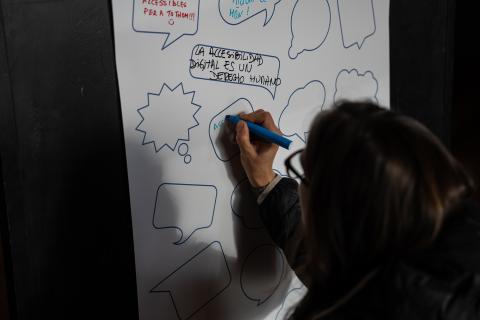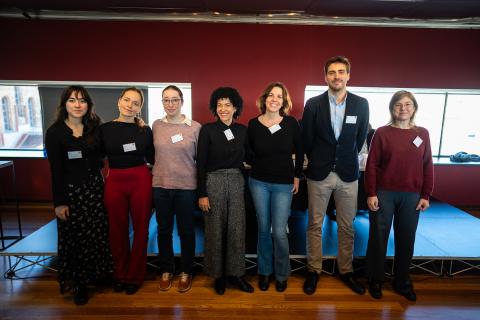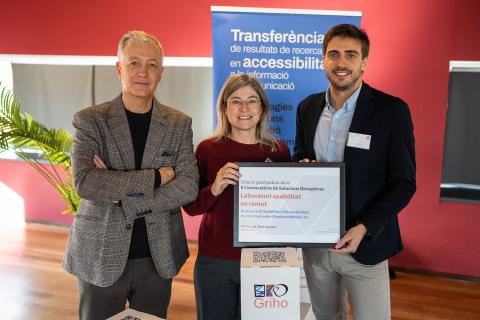On 13 December, the Network met with researchers, entities, and institutions to discuss accessibility from different viewpoints, ranging from current challenges to new services and technologies that provide solutions.
AccessCat Innovation Day took place on the morning of 13 December, at the observation point at the Centre of Contemporary Culture of Barcelona (CCCB), with the goal of bridging the gap between researchers from different research groups and entities, institutions, associations, and professionals in the field of information and communication accessibility.
During the registration process, before officially kicking off the event, attendees could plant a seed for accessibility (metaphorically, of course).
They did so by writing their wishes, claims, and appeals for a more accessible world on a mural. They wrote messages such as “digital accessibility is a human right”, “accessibility is justice”, or “let’s make the world easier to understand”.

The event began with an institutional welcome, given by Mireia de la Rubia, Assistant Director of the General Directorate of Knowledge Transfer and Society at the Government of Catalonia, Nadal Bayà, Head of Knowledge Transfer at AGUAR, and Rosa María Sebastián, Vice-rector of Innovation, Transfer, and Entrepreneurship at the Autonomous University of Barcelona.
The day continued with a presentation by the AccessCat Network. It was given by Anna Matamala, Director of the Network, who highlighted the figures that represent the impact AccessCat has had in the 2023-2024 period: 26 technologies and services, 30 educational resources, 63 companies and entities benefitted, 24 activities on educational transfer, 11 internal training activities, 43 awareness-raising and transfer activities, 11 international missions, 18 demos, 17 documents and high-level norms, and 11 calls for internal financing.

The results of the winning solutions for the AccessCat Network’s I Call for Disruptive Solutions were also presented, PlanAccess (TraDiLex, UPF) and SCRIBAL (CLiC, UB), which have just been awarded two grants from the 2024 Knowledge Industry programme from the Government of Catalonia.
Then, the four finalists of the II Call presented their projects:
- Collaborative Digital Mapping Platform for Mobility and Care in Urban Environments (Inés Martins, NODES, UOC).
- Remote Usability Lab: Usability and Web System Accessibility Evaluation (Web U+A Evaluation) (Afra Pascual and Marc Gonzalez, GRIHO, UdL).
- SCRIBAL: A Specialised Digital Transcriber (Mireia Farrús, CLiC (UB).
- Lulú, the communication barrier-breaker (Chiara Gunella and Marina Pujadas, TransMedia Catalonia, UAB).
After deliberation by the evaluation committee and the audience’s vote, GRIHO’s proposal was declared the winner.

Beyond the presentations on the I and II Call for Disruptive Solutions, a networking space was enabled to forge relationships between the attending organisms, entities, and researchers. Here, you can see a list of the 16 research groups that make up the Network.
The event concluded with three closing reflections from the director, through which she reminded attendees of why these events are important. Firstly, to make research in accessibility more visible, as well as the problems and challenges that are still unresolved. Secondly, to share resources, spaces, ideas, projects, and opportunities. And thirdly, to learn from each other. Ultimately, to create a network.
All the pictures from the event can be found here and downloaded in high resolution.



